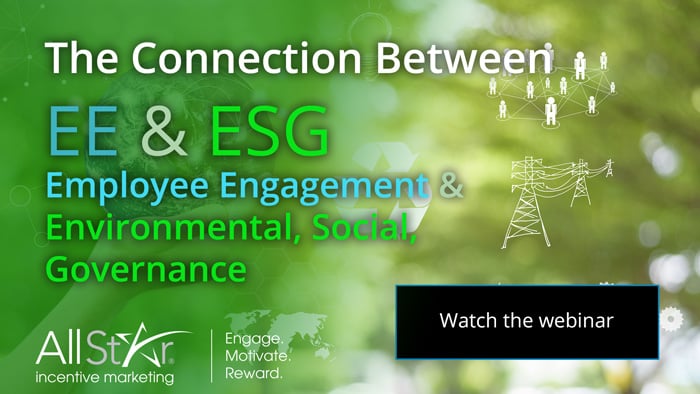
ESG refers to business leader’s focus on Environmental, Social and Corporate Governance in relation to their long-term plans. What can a focus on ESG mean to your business or profitability, and how can companies use employee engagement tactics to further the cause?
In 2017, over 140 CEOs from the World Economic Forum International Business Council (IBC) issued a “Compact for Responsive and Responsible Leadership”. The CEOs developed a framework that companies can use to track and demonstrate long-term sustainability. This compact aligns corporate goals to the long-term goals of society and identified “Sustainable Development Goals” (SDGs) as the roadmap for that alignment.
In our February and March blog posts, you’ll find an overview of the 4 pillars of ESG, and what they can mean for your business.
The 4 pillars of ESG that will be covered in this series of 4 blog posts are:
People
Prosperity
Part 3: People
Companies are realizing the benefit of shifting focus from providing solely shareholder value to stakeholder value. Successful companies understand that not only is environmental responsibility the right thing to do, but it’s one of the factors that retains key employees. Today’s employees want to know that the company they work for shares their values in terms of diversity and inclusion, social and environmental responsibility, ethics and more. Furthermore, both employees and consumers expect companies to fill the void left by government.
Companies with highly engaged employees realize a host of benefits including increased productivity, lower absenteeism, lower healthcare costs, lower turnover, increased market share, profitability and more. Gallup reports that on average, 35% of U.S. employees are fully engaged in their work. Conversely, 15% are actively disengaged; they’re actually harmful to the brand. In fact, it is estimated that disengaged employees cost business between $450 and $550 billion per year.
What’s the answer? Studies continue to show that highly engaged employees feel recognized and rewarded for their accomplishments. Properly structured incentive, reward and recognition programs not only ensure that employees are objectively recognized for their work, but these programs are critical vehicles in communicating company goals and values. It is imperative to work with experienced professionals in designing employee programs. An experienced firm can guide you to the most effective rewards (spoiler alert: tangible and experiential rewards produce higher gains) and avoid unintended consequences that are possible when companies try to design programs in house.
It has long been said that employees don’t leave companies…they leave managers. This is quickly changing as employees expect their company’s values to align with their own – and that the company will “walk the talk”.
To learn more about how ESG impacts employee engagement, view our latest webinar:



